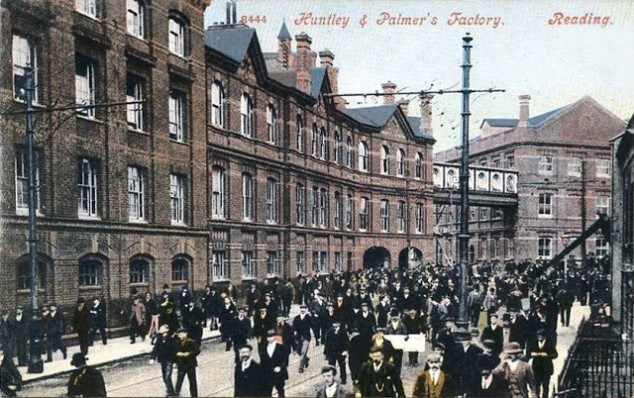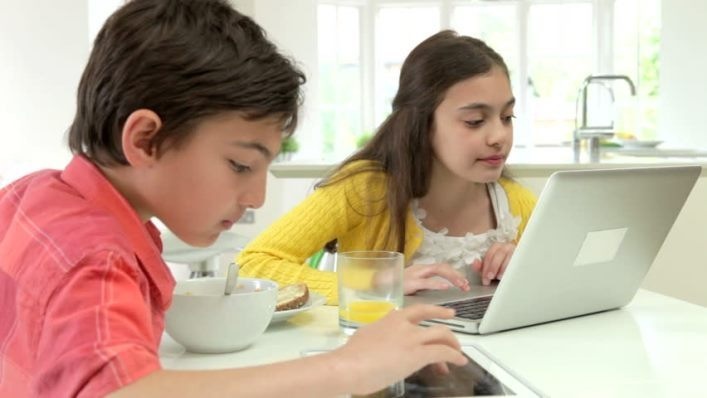“Let’s have some tea and continue to talk about happy things!”

It’s hard to imagine that the humble biscuit could be of been an intrinsic part of our nation’s imperialist past but, in fact, the 19th-century expansion of the British Empire owes much to Huntley & Palmers’ Ginger Nuts and Bath Olivers. Many famous expeditions were fuelled by such delicacies: Henry Stanley set off in search of Dr. Livingstone with supplies of them, and Captain Scott’s hut at Cape Evans on Ross Island still contains tins of Huntley & Palmers biscuits, specially developed for the expedition, that were left there in 1911.
‘Fancy’ biscuits, as opposed to those eaten for health purposes, were first produced commercially in Britain in the early 19th century. Peek Frean, McVitie’s and Jacob’s all became household names but, certainly in terms of collecting, it is Huntley & Palmers that stands out today.
I was an incredible proud grandson, my Grandfather started his working life in industry with Huntley and Palmers. He came to be liked by Lord Palmer and his family, in running the UK operations, before being sent to Paris to set-up and manage the firm’s first French biscuit factory, located near Paris. Grandfather always amused me as a child informing me around the challenges of managing and running a biscuit operation in France that was to educate the French in English biscuits. He always amused me with his stories and wisdom, and this was always shared over tea and of course with a Huntley and Palmer biscuit, Grandfather said ‘there was always a new biscuit for every occasion’, we always shared biscuits which sparked new conversations, incredibly precious moments.
Huntley and Palmer’s had quite a success story in their day, the company was opened by a Quaker, Joseph Huntley, in London Street, Reading, in 1822. As the business expanded, he was joined by his cousin, George Palmer, in 1841. The firm acquired a site on King’s Road in Reading five years later and by 1860 had expanded into the biggest biscuit and cake manufacturer in the world, turning out 3,200 tons of biscuits a year. By 1900, there were so many Macaroons, Pic Nics and Osbornes (named after Queen Victoria’s favourite palace) being made, that there were over 5,000 employees and Reading was known as ‘Biscuit Town’. Thanks to some superb marketing, the export trade was enormous too, with biscuits distributed across the globe. Ten per cent of total production went to India alone, presumably so that the Governor of Bengal and his chums could enjoy a good Thin Abernethy (‘made from the Choicest Materials’) with their tea.
The story of Huntley and Palmers
Huntley & Palmers was very much in Palmer control for the foreseeable future. By their combination of managerial and entrepreneurial talent the company flourished.
The eating habits of the middle classes were changing, and by the late 1860s it was fashionable to take afternoon tea. This provided the perfect market for biscuits, by which time Huntley & Palmers were producing about one hundred varieties, of which the Ginger Nut, Gem and Nic Nac were especially popular.
So, what happened to tea and biscuits, our afternoon tea, and our meaningful conversations with family and friends?
Afternoon tea was introduced in England by Anna, the seventh Duchess of Bedford, in the year 1840. The Duchess would become hungry around four o’clock in the afternoon. The evening meal in her household was served fashionably late at eight o’clock, thus leaving a long period of time between lunch and dinner.
The Duchess asked that a tray of tea, bread and butter (some time earlier, the Earl of Sandwich had had the idea of putting a filling between two slices of bread) and cake be brought to her room during the late afternoon. This became a habit of hers and she began inviting friends to join her.
This pause for tea became a fashionable social event. During the 1880’s upper-class and society women would change into long gowns, gloves and hats for their afternoon tea which was usually served in the drawing room between four and five o’clock.
Traditional afternoon tea consists of a selection of dainty sandwiches (including of course thinly sliced cucumber sandwiches), scones served with clotted cream and preserves. Cakes and pastries are also served. Tea grown in India or Ceylon is poured from silver tea pots into delicate bone china cups.

Nowadays however, in the average suburban home, afternoon tea is rare; likely to be just a biscuit or small cake and a mug of tea, usually produced using a teabag.
Has tea, family and friend’s discussions, meaningful conversations with others, just disappeared in the face of a busy life, technology overload and ‘do we just not have time?’
Once upon a time the biggest technological nuisance for the family was the phone ringing during dinner time. It is now common to see our loved ones hunched over their phones or tablets as they take one distracted bite of their food after another.
Once the plates are cleared the family might move to the living room for some television, but while the family may have once watched the program together, the new normal is to envelop yourself in a technological cocoon for the night.
Each person may catch the occasional glimpse of the show, but their attention is now being split between chatting with friends on the phone, watching YouTube clips and answering work emails.
Our fixation with technology has created new routines that are very different from traditional notions of family time.
The increasing ways we are using technology in isolation from one another is reflected by the latest figures from Britain’s communications regulator, Ofcom. A recent study found that for the first-time children aged between 12 and 15 are spending as much time online as they are watching television, about 17 hours a week for each.
Many of these children are now not even bothering to sit in the lounge room with the family when they are online, with 20 per cent of five-year-olds now more likely to be alone in their bedroom when online.
Even special family occasions are now infiltrated by mobile technologies.
The home is where children learn their values, specifically what is important in family life. Building a warm and cohesive connections are crucial not only for our own family, but for society as a whole.
The internet has irrevocably blurred the boundaries between work and home, meaning many parents are still working in one form or another when they are at home with their family. What message does a child receive when he or she is telling a story about something important that happened at school and mum stops listening to reply to an urgent message from the office?
Technology is now an integral part of our lives, the impact of culture in technology on children relationships is more noticeable than in families. This divide has grown due to the increased use of technology among children in several ways. First, children’s absorption in technology, from texting to playing video games, does by their very nature limit their availability to communicate with their parents.
Times have changed. New technology offers children independence from their parents’ involvement in their social lives, with the use of mobile phones, instant messaging, and social networking sites. Of course, children see this technological divide between themselves and their parents as freedom from over-involvement and intrusion on the part of their parents in their lives. Parents, in turn, see it as a loss of connection to their children and an inability to maintain reasonable oversight, for the sake of safety and over-all health, of their children’s lives. At the same time, perhaps a bit cynically, children’s time-consuming immersion in technology may also mean that parents don’t have to bother with entertaining their children, leaving them more time to themselves.
There is little doubt that technology is affecting family relationships on a day-to-day level. Children are instant messaging constantly, checking their social media, listening to music, surfing their favorite web sites, and watching television or movies. Because of the emergence of mobile technology, these practices are no longer limited to the home, but rather can occur in cars, at restaurants, in fact, anywhere there’s a mobile phone signal.
The fact is that family life has changed in the last generation quite apart from the rise of technology. Add technology to the mix and it only gets worse. It’s gotten to the point where it seems like parents and children are emailing and texting each other more than they’re talking even when they’re at home together!
The ramifications of this distancing are profound. Less connection — the real kind — means that families aren’t able to build relationships as strong as they could be nor are they able to maintain them as well. As a result, children will feel less familiarity, comfort, trust, security, and, most importantly, love from their parents.

So, what is the answer? Change and transformation is always challenging in any environment and sometimes faced with strong reluctance, some of the best moments of my life have been spent with my grandparents in cheer and of course with tea and Huntley and Palmer biscuits.
Pope Francis recently addressed some participants, reminding them of the pre-eminence of love. “The life of a family is filled with beautiful moments: rest, meals together, walks in the park or the countryside, visits to grandparents or to a sick person… But if love is missing, joy is missing, nothing is fun. Jesus always gives us that love: he is its endless source.” He also exhorted people to learn from the wisdom of grandparents: “[A person or] people that does not listen to grandparents is one that dies! Listen to your grandparents.”
While your children and parenting will have many influences on their moral development, you always play the biggest role. You are their first teacher and role model. They look to you to learn how to act in the world.
While your words are important, it will be your actions that will teach them the most. How are your actions guiding your children in living up to your highest values?
There is a big difference between knowing about values and actually trying to adopt the traits. Often standing up for your values takes courage and strength, grandparents can be a huge help and influence on your children’s life in this chaotic, overcrowded, technological world that we all live in.
As my grandparents would always say to me and as this quote states from Chaim Potok:
“Come, let us have some tea and continue to talk about happy things.”
Articles from Geoff Hudson-Searle
View blog
“I want you to understand that the island of Ceylon is for its size the finest island in the world, ...

I recently had a meeting in the City of London with a group of executives – the interesting fact was ...

A recent publication by Business Mondays, published a recent interview on Geoff Hudson-Searle, that ...
Related professionals
You may be interested in these jobs
-
Marine Environmental Consultant
Found in: Jooble UK O C2 - 6 days ago
undisclosed Glasgow, United KingdomEnvironmental Consultant/Senior Consultant (with Marine Mammal Ecology expertise) · Competitive salary, aligned to experience. · Affric Limited is a growing, successful, and ambitious environmental consultancy based in Inverness, in the North of Scotland. Affric provide professio ...
-

Global Mobility Tax Specialist
Found in: beBee S2 UK - 1 day ago
EthosEnergy Group Aberdeenshire, United Kingdom Full timeReference · EPR007885 · Posting Reference · Location · Aberdeen, UK · Type · FTE · Job Category · Finance · Apply for this Job · In this role you will undertake tax and social security planning in relation to international assignments. By doing so, you will work in collab ...
-

Lawyer
Found in: beBee Professionals UK - 2 days ago
Direct apply
beBee Professionals England, United Kingdom Full timeResponsibilities: · - Provide legal counsel and representation to clients in various areas of law, such as corporate law, litigation, or family law. · - Conduct legal research and analysis to prepare cases and advise clients on legal matters. · - Draft legal documents, contracts, ...


Comments
Geoff Hudson-Searle
6 years ago #23
Thank you Savvy Raj for your wonderful words. I agree entirely; there is a hug difference between knowing about values and actually adoption of the traits in the same speaking about values and actually practicing values and beliefs. Have a lovely weekend!
Proma Nautiyal
6 years ago #22
That's so sweet of you, Lisa Vanderburg, Thank you! I am glad my comment made you happy. :-)
Harvey Lloyd
6 years ago #21
Yes, i most say that me and the wife, of the boomer gen. long for those discussions we used to have about rational ideals and exploration. We both feel as though you have to get your point across in 140 characters or less. So mostly we are quiet. The amazing aspects of general conversation they almost feel guided these days. As if a map exists that folks will guide you to a place. A shallow place and then the impending vote, where i am suppose to say, "I know, right." My real come back is not acceptable in most company. Secondarily most conversation within our age group tends to be negative towards politics, retirement or young people. My only solace is work. We have created a can do culture and it is exciting to work with the team. Family is the main focus these days. Social not so much. Thanks for your feedback and kind words.
Geoff Hudson-Searle
6 years ago #20
Great to hear from you Gert Scholtz and thank you for your comments. Good to know that in all parts of the world this wonderful tradition appears to be fading, I guess the answer is whether its tea, coffee or a glass of wine with great company, this becomes quality time with family, friends and loved ones.
Geoff Hudson-Searle
6 years ago #19
Thank you Harvey Lloyd always amazing to receive your comments and thoughts. Interesting enough some research, which comes at the start of the Age UK's annual iTea and Biscuits week, revealed that on average 61 per cent of older people in England are offline and that there are only four areas in England where the percentage of older people online, outnumber those who are offline. Age UK Cheshire encouraged older people who had never been online, to try out the technology for themselves at their Techy Tea Party, which was held on Wednesday 18th September at Castle Community Centre, Northwich. The event was for all older people who wanted to get to grips with digital technology. Personally, I still believe that tea, biscuits and great company does not need to be accompanied by a smart phone :-)
Geoff Hudson-Searle
6 years ago #18
Thank you Pascal Derrien for your wonderful comments and share, amazing! :-)
Geoff Hudson-Searle
6 years ago #17
Absolutely Deborah Levine, I always have time for tea and Human 2 Human time! :-) Your question across what will happen to the elderly in a world where many don't interact with other generations. Will we lose what they have to offer and will they be isolated in senior citizen sites? It's not just the children who are at risk is one that I often write about, however, my views are this question is not only isolating the elderly but all generations are affected with isolation, loneliness, depression and ultimately mental health issues. The facts, do we actually have time for our most precious relationships, do we give the time to build lasting, loving relationships around trust and values or do we constantly feel we can always do better with the latest api or technology app? Staggering advances in technology, communications and sciences across the world is one of the defining aspects of the last few decades. Our childhoods taught us to value love; but our institutions, cities, and technology have taught us to fear commitment and put choice first. We are trapped in a self-perpetuating cycle of emotional distance with each other. Most of us really want love at some point, but our actions are at war with this desire. We maintain emotional distance because we fear commitment and rejection, not because that is our true self.
Geoff Hudson-Searle
6 years ago #16
Lovely comments Franci\ud83d\udc1dEugenia Hoffman, beBee Brand Ambassador which reminisces the beautiful past of a wonderful tradition, I loved spending time with my Grandparents in deep conversation of laughter, joy and cheer over tea and wonderful biscuits, these moments will never be forgotten, and it was truly civilized too!
Geoff Hudson-Searle
6 years ago #15
Thank you Lisa Vanderburg has made some really amazing points that are incredibly relevant. My go to guy on the subject of slowness is Carl Honore, he wrote In the Praise of Slow and has a slow movement, it is quite crazy to think that you can now do courses in Speed Yoga or attend a Drive Thru Funeral. A magazine in Britain even published an article recently on how to bring about an orgasm in 30 seconds! So even in the bedroom it’s, “On your marks, get set, go!” Our speedaholism is out of control, and we all know it. Perhaps we should revolutionize tea in the afternoon! :-)
Geoff Hudson-Searle
6 years ago #14
Thank you Proma \ud83d\udc1d Nautiyal so lovely to hear about your love for tea and tradition and for your wonderful comments. There’s something about that firm bitterness that sparks devotion: believe it or not the British consume 60 billion cups per year, according to the Tea and Infusions Organisation. But for me culture is the invisible bond which ties the people of a community together. Our tea, our art, our literature and most importantly our language and communication define us. They make us who we are. It has been rightly said that a community is only as strong as its language and culture. There is an amazing quote by Andre Malraux'"Culture is the sum of all the forms of art, of love, and of thought, which, in the course of centuries, have enabled man to be less enslaved."
Lisa Vanderburg
6 years ago #13
Good point Deborah Levine!
Gert Scholtz
6 years ago #12
Harvey Lloyd
6 years ago #11
Thanks for the tag Lisa Vanderburg you kindled some stories from my childhood with visits to grandparents and card playing Does seem as though something is missing in child development these days. Emotional development happens somewhere. The question is always where. Tea and biscuits or the family dinner table seem to be the standards of the past. I’m not sure that technology is a suitable replacement. Thanks for the stroll
Pascal Derrien
6 years ago #10
Lisa Vanderburg
6 years ago #9
Excellent additions and thoughts Geoff Hudson-Searle that make me wonder; are we on the verge of a social precipice (or is that just my crank-hood showing)? Even if that were to be the case, do we really want to turn it around or have we realized the speed at which we're exploding makes life somehow less appealing? Then, I read the lovely Proma \ud83d\udc1d Nautiyal comment and all is well in the world! I would love to know what others think (and yes, bring on the second buzz!): Ali \ud83d\udc1d Anani, Brand Ambassador @beBee?
Proma Nautiyal
6 years ago #8
Geoff Hudson-Searle
6 years ago #7
Thank you John for your comments, I guess in reality whether you drink tea, coffee or courage with family and friends you will still be having Meaningful Conversations.
Geoff Hudson-Searle
6 years ago #6
Thank you Debasish Majumder for your lovely comments and share.
Geoff Hudson-Searle
6 years ago #5
Thank you Lisa Vanderburg my Grandpa was an amazing and very special man. I agree, the family unit is undergoing significant challenges and loss of unity and values is incredibly sad for many. Modern living is creating an epidemic of binge drinking, irritability, loss of sex drive and indigestion, it is claimed. The findings of a report, 'Living in the Fast Lane', showed that nearly 550 adults aged 25 and over highlighted the extent to which people are struggling to juggle work commitments with the demands of family and keeping up with friends.These implications run deep across various diverse disciplinary boundaries and have serious consequences for a variety of prominent social issues. Looking at the evolutionary basis for the fast life has implications for all the different gradations of how people live their lives, from fast to slow, glamorous to poverty-stricken, and for topics as diverse as the origins of human evolution, human development, childhood attachment, adult romantic attachment, nature/nurture interactions, the role of mating strategies in human mating intelligence, social deviance, pop culture, intelligence, creativity, social class disparities, crime, delinquency, social policy, and reducing economic, gender, and ethnic inequalities. This subject deserves another buzz! :-)
Geoff Hudson-Searle
6 years ago #4
Thank you Lisa Vanderburg my Grandpa was an amazing and very special man. I agree, the family unit is undergoing significant challenges and loss of unity and values is incredibly sad for many. Modern living is creating an epidemic of binge drinking, irritability, loss of sex drive and indigestion, it is claimed. The findings of a survey of a report, Living in the Fast Lane, nearly 550 adults aged 25 and over highlights the extent to which people are struggling to juggle work commitments with the demands of family and keeping up with friends.These implications run deep across various diverse disciplinary boundaries and have serious consequences for a variety of prominent social issues. Looking at the evolutionary basis for the fast life has implications for all the different gradations of how people live their lives, from fast to slow, glamorous to poverty-stricken, and for topics as diverse as the origins of human evolution, human development, childhood attachment, adult romantic attachment, nature/nurture interactions, the role of mating strategies in human mating intelligence, social deviance, pop culture, intelligence, creativity, social class disparities, crime, delinquency, social policy, and reducing economic, gender, and ethnic inequalities. This subject deserves another buzz! :-)
John Rylance
6 years ago #3
Debasish Majumder
6 years ago #2
Lisa Vanderburg
6 years ago #1